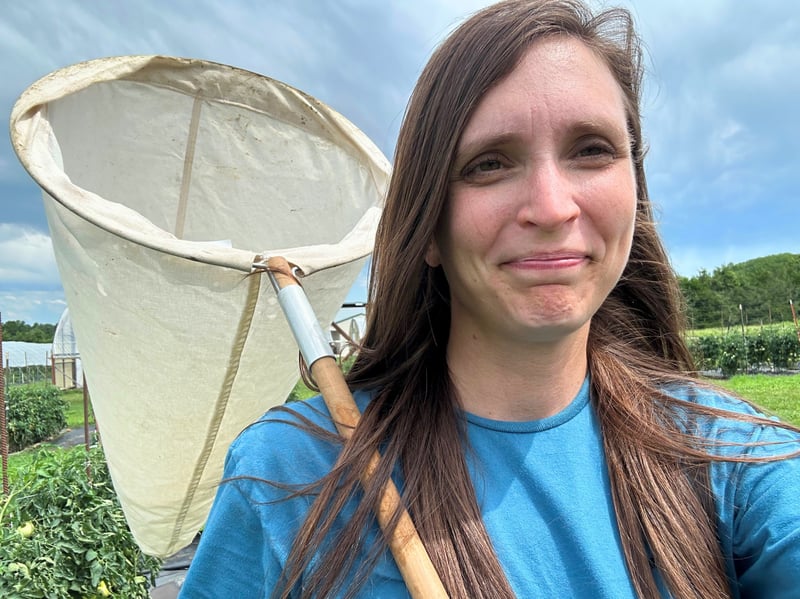
Balancing a full-time teaching career, parenting two young children and pursuing a second master’s degree might seem impossible to most—but not to Beck Layne.
An assistant professor of environmental science and sustainable agriculture at Johnson County Community College (JCCC), Layne also is a graduate student in the horticulture master’s program with an emphasis in urban food systems at Kansas State University Olathe. With 15 years of teaching experience, she’s still learning and thriving.
“I am a mom and professor first, and I wear many hats as a researcher and a student as well," she said. "My work is driven by a deep passion for sustainability, conservation and the relationship between humans and the natural world."
Connecting Career to the Classroom
Layne enrolled in the urban food systems program because of its focus on sustainability and community-driven agriculture, making it the ideal fit for both her personal interests and her evolving professional goals as she expands her teaching into JCCC’s sustainable agriculture program. As urban farming became a growing topic of interest among her students, she wanted to be able to meet their curiosity with deeper knowledge and firsthand experience.
“I thought it would be a great place for me to learn more about the areas where my students have interest,” she said. “As someone new to agriculture, I could have felt like an outsider. Thanks to the support of my professors, I was able to pursue my specific interests connecting agriculture and conservation. It has been incredibly rewarding to discover a place in agriculture that feels uniquely my own.”
That support has led her to a research project exploring insect diversity across urban, suburban and rural farms in the Kansas City area. Partnering with small-scale farms, Layne is studying how different land features influence biodiversity—insights that could shape more sustainable farming practices in the future.
“The insect diversity data we're collecting could help farmers make more informed decisions about site selection and land development to support beneficial insects and manage pests,” she said.
Real-World Impact
Beck’s coursework doesn’t stay in the classroom or even in the lab. From aquaponics to soil health, Layne is now able to offer her students hands-on opportunities she wouldn’t have been able to before.
“This program has exposed me to so many facets of agriculture—crop production, land stewardship, social sustainability and food justice—and that’s made me a better educator,” she said. “I’ve enhanced my ability to connect the science I teach to real-world applications, providing me with new, relevant examples that resonate with my students.”
The Power of Online Learning
As a working parent and full-time professor, flexibility was non-negotiable. The fully online format of the professional track in the Urban Food Systems program made it possible for Layne to continue her education without putting her life on hold.
While the traditional research-based program remains a cornerstone of the department, growing demand from working professionals inspired faculty to develop this second, more accessible option—allowing more people like Layne to pursue their career goals without sacrificing their personal or professional responsibilities.
“Taking my degree program online has been a game changer,” she said. “It’s allowed me to continue working, raising my kids and still push myself academically. There’s no way I could’ve done this otherwise.”
And being an online student herself has helped her grow as an online instructor, too. She’s gained new insight into the student experience, and it’s made her even more intentional about keeping her virtual classroom engaging and human centered.
“Online learning requires more self-motivation and initiative,” she said. “I’ve seen firsthand how important it is to keep students engaged and remind them there’s a real person on the other side of the screen.”
A Supportive Community
Layne is quick to credit the people around her, from her professors at K-State Olathe to her colleagues and leadership at JCCC, for helping her succeed.
“Time management comes with the grace of a lot of people,” she said. “And yes, it also involves waking up really early sometimes.”
Her experience has opened new professional and personal doors, sparked new passions and given her a deeper connection with her students.
“I think being a student again helps me relate to my students more. We all have deadlines. We’re all juggling a lot. But we’re all here to support each other in learning.”
Looking Ahead
Her advice to others considering going back to school?
“Go for it. It’s possible. Take it piece by piece. It’s not a race. Give yourself grace. It’s challenging at times but it’s worth it.”


